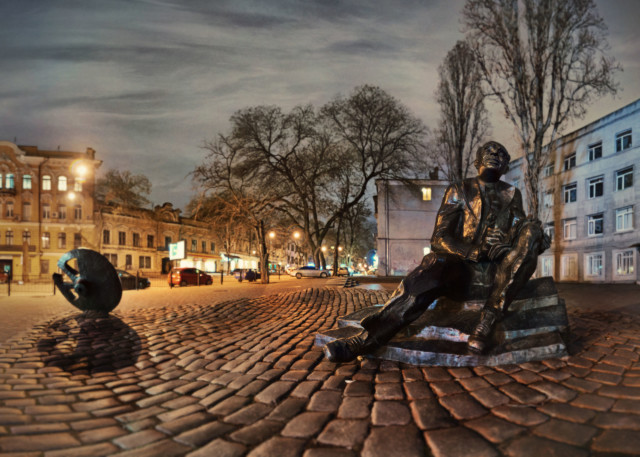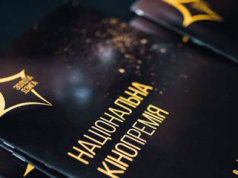‘Odessa’ by Isaac Babel
Translated by Val Vinokur
Photo by Igor Sytnik
Odessa is a nasty town. Everybody knows this. Instead of saying “what’s the difference,” over there they say, “what’s the differences,” and also, instead of “here and there,” they say, “hayr and thayr.” But still, it seems to me you could say a lot of good things about this important and most remarkable city in the Russian Empire. Just consider – a city where life is simple and easy. Half of the population consists of Jews, and Jews are people who are sure about a few basic things. They get married so they won’t be lonely, make love so they will live forever, save up money to buy their wives astrakhan jackets, love their offspring because, after all, it’s very good and important to love one’s children. Poor Jews in Odessa can get very confused by officials and official forms, but it isn’t easy to shift them from their ways, their fixed and ancient ways. Shift they will not, and one can learn a lot from them. To a significant degree, it is thanks to their efforts that Odessa has such a simple and easygoing atmosphere.
An Odessan is the opposite of someone from Petrograd. It is becoming axiomatic that Odessans do very well in Petrograd. They make money. They are brunettes – so naturally the city’s soft blonde ladies fall in love with them. In general, an Odessan in Petrograd tends to settle on Kamennoostrovsky Prospect.1 I’m not setting up a joke here. No, sir. This is about something more profound. Quite simply, these brunettes bring a little sunshine and lightheartedness with them.
Aside from gentlemen bringing a bit of sun and a lot of sardines in their original containers, I would also think that there will come – and come soon – the prolific, life-giving influence of the Russian south, of Russian Odessa, which may be (qui sait?) the only city in Russia where our very own and much needed national Maupassant will be born. In fact, I perceive the tiniest slender wisps of a premonition – Odessan chanteuses (I speak of Isa Kremer)2 with small voices, but full of joy, joy artfully expressed in their very being, a fervent and light, charmingly sad yet touching feeling for a life that is good and bad and extraordinarily – quand meme et malgré tout – interesting.
I saw Utochkin, and Odessan pur sang, carefree and profound, fearless and absentminded, graceful and gangly armed, brilliant and stuttering. They say he’s been consumed by cocaine or morphine since he fell out of his airplane over some swamp in Novgorod Province. Poor Utochkin, he’s lost his mind, but all the same it’s clear to me that soon the time will come when Novgorod Province will walk itself over to Odessa.3
”in the evening, out at their comical vulgar dachas, beneath the dark velvety sky, the fat comical bourgeois lie about on their day beds in white socks”
Above all, this city simply has the material conditions necessary to nurture, let’s say, the talents of a Maupassant. In the summer, its sunny bathing establishments gleam with the bronzed and muscled physiques of young sports enthusiasts, the powerful bodies of fisherman, who are not sports enthusiasts, the fat, round-bellied, amiable bulks of the “gentlemen of commerce,” the pimply scrawny dreamers, inventors, and brokers. And a small distance from the deep wide sea, there are factories puffing smoke and Karl Marx up to his usual business.
In Odessa there is a very poor and crowded, long-suffering Jewish ghetto, a very self-satisfied bourgeoisie, and a very Black Hundreds town council.
In Odessa, there are sweet and languorous spring evenings, the spicy scent of acacia, and the unwavering and irresistible light of the moon above the dark sea.
In Odessa, in the evening, out at their comical vulgar dachas, beneath the dark velvety sky, the fat comical bourgeois lie about on their day beds in white socks, digesting their five courses… Behind the bushes, their powdered wives, fat from idleness and naively corseted, are passionately squeezed by temperamental physicians and jurists.
In Odessa the “luftmenschen” root around the coffee houses trying to make a ruble and feed the family, but there’s nothing to be made, because what can a completely useless person – a “luftmensch” – really make?
In Odessa there is a port, and in the port – ships from Newcastle, Cardiff, Marseilles, and Port Said; Negroes, Englishmen, Frenchmen, and Americans. Odessa has known prosperity, and now knows its own decline – a poetic, rather carefree and utterly helpless decline.
“Odessa,” the reader will finally say, “is a city like any other city, and you are just exceedingly biased.”
All right, so I’m biased, it’s true, maybe even exceedingly so, but parole d’honneur, there is something to it. And a truly human being will sense this something and will say, true enough, life can be sad and monotonous, but all the same – quand meme et malgre tout – extraordinarily, most extraordinarily interesting.
From these thoughts about Odessa my mind turns to deeper things. If you think about it, doesn’t it seem that in Russian literature one has yet to find a truly joyful and vibrant description of the sun?
Turgenev sang of the dewy morn, the stillness of the night. With Dostoevsky you can feel the uneven grey pavement along which Karamazov walks to the tavern, the heavy and mysterious Petersburg fog. Those grey roads and shrouds of fog have stifled people and, having stifled them, contort them in amusing and awful ways, giving birth to a rumble and jumble of passions, making people even more frantic amidst the usual human bustle. Do you remember the bright and fructifying sun in Gogol, a man who came from the Ukraine. If there are such descriptions, they are but a passing phase. And not the phase with “The Nose,” “The Overcoat,” “The Portrait,” and “Diary of a Madman.” Petersburg defeated Poltava, Akaky Akakievich has modestly but with brutal efficiency overwritten Gritsko, and Father Matvei finished off what Taras had begun. The first person who started to talk about the sun in a Russian book, and to talk about it ecstatically, passionately, was Gorky. But the very fact that he talks about it ecstatically and passionately means that it’s still not quite the real thing.
”But he is not the singer of the sun, but a herald of the truth”
Gorky is a precursor, and the mightiest in our time. But he is not the singer of the sun, but a herald of the truth: that if there is one thing worthy of song, you can be sure it is the sun. In Gorky’s love of the sun there is something cerebral; it is only thanks to his enormous talent that he overcomes this obstacle.
He loves the sun because Russia is rotten and perverted, because in Nizhny and in Pskov and in Kazan people are flabby, thick, sometimes incomprehensible, other times pitiful, and sometimes just incredibly and stupefyingly boring. Gorky knows why he loves the sun, why one is supposed to love it. This awareness is in fact the reason why Gorky is a precursor, an often mighty and magnificent one, but a precursor.
As for Maupassant, maybe he doesn’t know anything, and maybe he knows everything; a covered wagon clatters down a scorched road, in the carriage sit the fat and sly Polyte and a strapping clumsy peasant lass. What they’re doing in there and why there are doing it – that’s their business. The sky is hot, the earth is hot. Polyte and the lass are dripping with sweat, while the wagon clatters on the bright scorched road. And that’s all.
Lately, there’s been a lot of writing about how people live, love, kill, and elect local village councils in the province of Olonetsk, Vologda, or, say, Archangelsk. All of it is written in the most authentic dialect, exactly like they speak in Olonetsk and Vologda. People live there, it turns out, and it’s cold, and there’s a lot of rough stuff. An old story. And pretty soon people will get sick of reading about this old story. Actually, they’re already sick of it. And what I think is, Russians will be drawn south, to the sea and the sun. Will be drawn? No, in fact, that’s wrong. They have been drawn already, for many centuries. It is in Russia’s persistent drive to the steppe, even perhaps “to the Cross of the Holy Sophia,”4 that she will find her way.
People feel the blood should be refreshed. It’s stifling here. The literary Messiah, awaited in vain for so long, will arrive from there – from the sunny steppe, washed by the sea.
1 Known as the Gallery of Art Nouveau because of its turn-of-the-century buildings, Kamennoostrovsky Prospect was, in the words of Osip Mandelstam, “one of the lightest and most irresponsible streets of Petersburg” (Mandelstam, The Egyptian Stamp).
2 Isa Kremer (1885-1956) was a Russian Jewish soprano who moved to Odessa when she was twelve and began writing revolutionary poetry for a local paper. After studying opera in Milan, she went on to become a star of classical and popular song, singing in many languages, including Yiddish. She eventually moved to the United States and then settled in Argentina.
3 Sergei Utochkin (1876-1915), pioneering Russian aviator, born in Odessa. In 1929, fellow Odessan Yuri Olesha would write that Utochkin “was considered a freak. He was a subject of fun. It’s unclear why that was. He was one of the first to ride a bicycle, a motorcycle, an automobile, one of the first to fly. People laughed. He crashed flying between Petersburg and Moscow. People laughed. He was a champion, but in Odessa they thought he was the town madman.”
4 The Holy Sophia (Hagia Sophia or Holy Wisdom) is the cathedral that served as the seat of the Orthodox Patriarchate of Constantinople from 537 until 1453, when it was converted into a mosque by the Ottomans. It became a museum in 1935. Many Russian ideologues – including Dostoevsky – believed that it was Russia’s messianic destiny – as the last remaining Christian Empire or “Third Rome” – to retake Constantinople from the Muslim Turks.





































Pingback: Isaac Babel and Paul Berger – Odessa!()